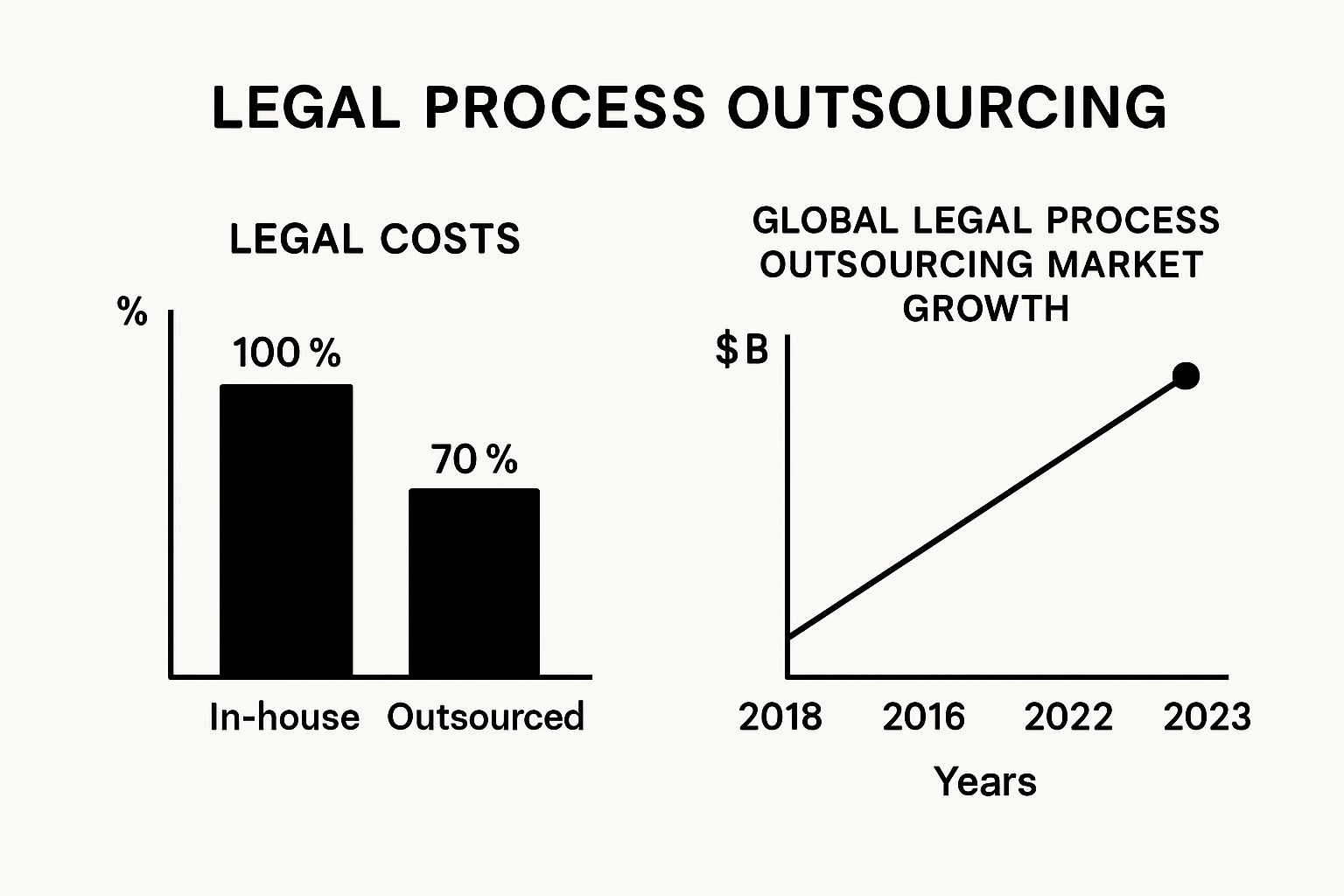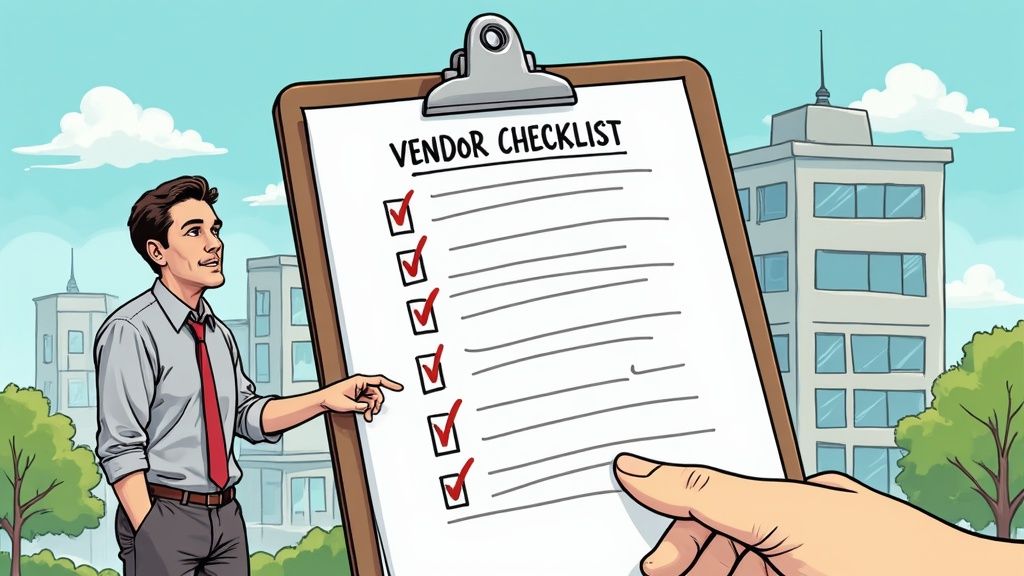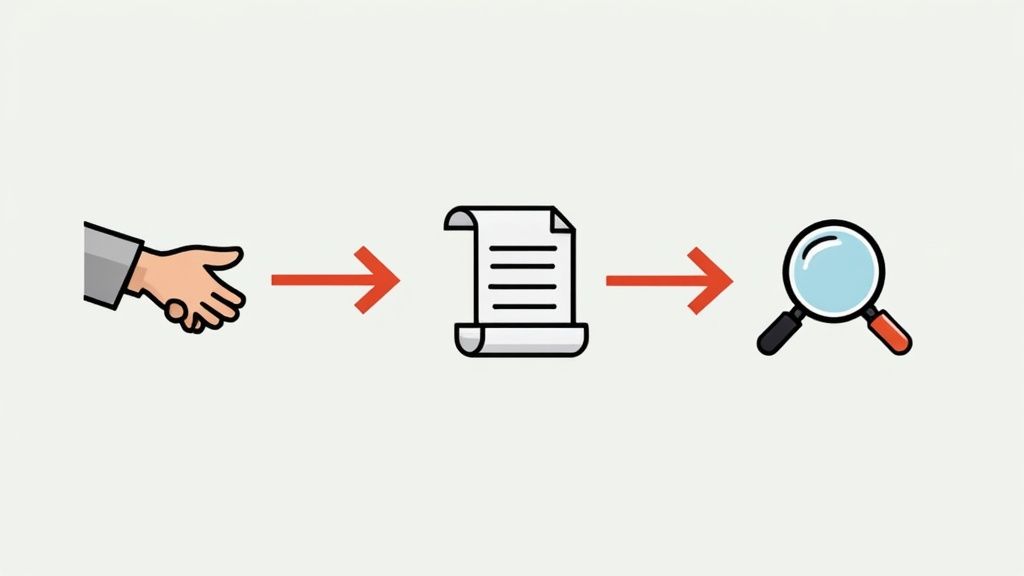
 22 minutes read
22 minutes read
Let's get straight to the point. Your best attorneys are drowning in document review, your overhead is creeping up, and you're starting to wonder if you need to mortgage the office ping-pong table to make payroll. This isn't sustainable. Outsourcing legal process work isn't just a cost-cutting tactic anymore; it’s a strategic lifeline. It’s about getting your heavy hitters back to high-stakes litigation and rainmaking—the kind of work that actually grows your firm.
Forget the old stereotypes. This isn't about shipping jobs overseas for pennies on the dollar and hoping for the best. Think of it as plugging a specialized, on-demand extension into your team, without the crippling cost of another full-time hire.
It’s a strategic move that can build a more agile, resilient, and profitable practice. But let’s be blunt: when you get it right, it's a game-changer. When you get it wrong, it’s a costly, soul-crushing headache. My goal is to help you get it right.
This chart breaks down the hard numbers, showing a clear comparison between in-house costs and outsourced alternatives, while also highlighting the explosive growth of the LPO market.

The data tells an undeniable story. Firms are saving significant capital by outsourcing, and the market's rapid expansion proves this is a fundamental shift in how modern legal work gets done.
The traditional model of hiring full-time staff for every single task is starting to look pretty outdated. It’s expensive, rigid, and frankly, a terrible fit for the fluctuating workloads that define a modern law practice.
Hope you enjoy spending your afternoons fact-checking resumes and running interviews—because that’s now your full-time job. When you hire in-house, you're not just paying a salary. You're on the hook for:
This model forces your most valuable people—your senior attorneys—to spend their precious time putting out administrative fires instead of practicing law. It's a slow burn that silently eats away at your profitability.
Now, let's look at the alternative. Outsourcing legal processes isn’t about replacing your team; it’s about augmenting it. It’s about identifying the high-volume, repetitive tasks that are bogging everyone down and handing them off to a pro who lives and breathes that specific work.

The real goal isn't just to cut costs, but to reallocate your resources. By outsourcing process-driven work, you free up your top-tier talent to focus on high-value, client-facing activities that drive revenue. Toot, toot!
This isn't just a theory; the market is booming for a reason. Projections show the Legal Process Outsourcing (LPO) market soaring from an estimated USD 21.6 billion in 2025 to USD 157.9 billion by 2035. That's a massive compound annual growth rate of 22.0%. Firms aren't just testing the waters anymore; they're diving in headfirst.
This strategic shift allows you to operate with the agility of a startup while maintaining the gravitas of an established firm. You can easily scale up for a massive e-discovery project and then scale back down a month later without any of the usual HR headaches. You can explore a range of legal outsourcing services to see how they can be tailored to your firm's specific needs. It's all about building a leaner, more efficient, and more profitable operation.
Moving from a traditional in-house model to an outsourced one isn't just about cost. It involves a fundamental shift in how you manage workflows, control, and company culture. Here’s a pragmatic look at what you gain and what you give up.
| Factor | Traditional In-House Team | Outsourcing Legal Process (LPO) | The Bottom Line |
|---|---|---|---|
| Cost Structure | High fixed costs (salaries, benefits, overhead) | Variable costs based on usage; pay only for work done | LPO offers significant cost savings, especially for fluctuating workloads. |
| Control & Oversight | Direct, hands-on management and immediate supervision | Relies on clear communication, SOPs, and performance metrics | In-house gives more direct control; LPO requires strong process management. |
| Scalability | Slow and expensive; requires a lengthy hiring process | Rapid and flexible; scale team up or down on demand | LPO is far more agile for handling unpredictable case volumes. |
| Access to Expertise | Limited to the skills of your current employees | Access to a global pool of specialized talent and technology | LPO provides access to niche expertise without the cost of a full-time hire. |
| Team Integration | Deeply integrated into firm culture and daily operations | Operates as an external partner; requires intentional integration efforts | In-house fosters stronger cultural bonds, but LPO can be integrated effectively with good management. |
Ultimately, the choice isn't about which model is "better" in a vacuum, but which one better serves your firm's strategic goals. For many, a hybrid approach—keeping core strategic functions in-house while outsourcing process-heavy tasks—offers the perfect balance of control, cost-efficiency, and scalability.
Alright, let’s get down to the brass tacks. Before you even think about signing a contract with a Legal Process Outsourcing (LPO) provider, you need to look at this from every angle.
On paper, the benefits of LPO look incredible. But let me be clear: anyone who tells you it’s all sunshine and easy cost savings is either trying to sell you something or has never actually managed an offshore team at 2 AM. The reality is a lot more nuanced.
The upsides are obvious and powerful. We’re talking about serious cost reduction, access to a global talent pool you could never tap into locally, and the magic of a 24/7 operational clock. Your firm can suddenly churn through mountains of discovery documents on a massive case while your domestic team is sound asleep. That’s not just an advantage; it's a competitive weapon.
But pretending the risks aren't just as real is a classic rookie mistake. Get ready for miscommunications that pop up in emails sent from a different time zone. Quality control can evaporate overnight if you aren't militant about your oversight. And data security? One slip-up there doesn't just cost you a client; it can torpedo your firm's reputation for good.

Let’s not dance around it. The number one reason law firms start looking into outsourcing is to stop hemorrhaging cash. The cost differential between hiring in-house in the US and partnering with an offshore provider can be staggering. You can often hire highly qualified legal professionals for a fraction of what you’d pay for equivalent talent in New York or Los Angeles.
This isn’t just about lower salaries, though. It’s about ditching all the ancillary costs that slowly bleed a firm dry. Think about what you'd save on:
The financial argument is so compelling that it’s driving a massive global trend. The Legal Process Outsourcing market hit about USD 15.3 billion in 2023, and of that, offshore outsourcing made up a whopping USD 12.15 billion. Firms are voting with their wallets.
Now for the dose of cold reality. The risks of LPO are subtle, insidious, and can cripple an unprepared firm. Before you get dazzled by the dollar signs, you need a solid plan to mitigate these very real threats.
First and foremost, data security is non-negotiable. You are handing over incredibly sensitive client information. A breach isn’t just embarrassing; it’s a potential ethics violation and a lawsuit waiting to happen. You have to ensure your LPO partner’s security protocols are as good as—or even better than—your own.
Second, quality control can become a nightmare. You lose the ability to walk down the hall and check in. Without ironclad standard operating procedures (SOPs) and a rigorous review process, you’ll spend more time fixing mistakes than you would have spent doing the work yourself in the first place.

The biggest mistake I see is firms treating outsourcing like a vending machine. You can't just put a dollar in and expect a perfect work product to pop out. This is a partnership that requires active, hands-on management, not a fire-and-forget solution.
This is where the conversation gets really interesting. When you stop thinking about outsourcing as just a cost-cutting tool and start seeing it as a strategic lever, everything changes. The real magic isn't just in saving money on routine work; it's about what you do with that newfound efficiency.
By outsourcing the high-volume, process-driven tasks, you liberate your most expensive assets—your senior attorneys and partners—to focus exclusively on high-value, strategic work. Their time is no longer diluted by tasks that a specialized provider can handle faster and for less. This is how you really move the needle on profitability.
This shift in focus is one of the core benefits of outsourcing legal services. The challenge, of course, is finding a partner who gets this. You don't want a cut-rate task rabbit. You need a true extension of your team—a partner who upholds your quality standards and operates with the same sense of urgency. Find that, and you’ve found the key to scaling your firm intelligently.
Let's clear the air on something important. When people hear "legal outsourcing," they sometimes imagine shipping off their core legal strategy or client relationships. That's not what this is about. That's your secret sauce—the very reason clients hire you.
You outsource the process, not the brain.
Think of it this way: you're delegating the engine room work—the grinding, repetitive, but absolutely critical tasks—so the captain can stay on the bridge, steering the ship. It’s about being a better captain, not replacing the engine.
The best candidates for outsourcing are the tasks that make your senior associates' eyes glaze over. We're looking for work that is repetitive, scalable, and doesn't require deep, nuanced institutional knowledge unique to your firm or a specific client.
So, what does this look like in practice? Certain legal tasks are practically custom-built for an effective outsourcing strategy. If your firm handles any of the following, you're sitting on a goldmine of outsourcing potential.

The golden rule is beautifully simple: If you can systematize it into a clear, step-by-step process, you can probably outsource it effectively. If a task relies on gut feeling, personal relationships, or years of firm-specific history, keep it in-house.
It’s just as important to know what not to outsource. Sending the wrong work out the door is a fast track to disaster, frayed client relationships, and a whole lot of expensive cleanup.
Keep these functions close to home:
Think of it like a top chef running a restaurant. The chef develops the recipes, tastes every dish, and interacts with the guests. They don't spend their time peeling potatoes or washing dishes; they delegate that work so they can focus on delivering an exceptional final product. Your approach should be no different. Exploring virtual paralegal services can be the first step in offloading that routine work.
So, you’re sold on the idea. Great. Now comes the part where most firms drop the ball, and they drop it hard. They get so dazzled by the low hourly rates that they forget to ask the most important questions.
Picking the wrong partner isn't just a minor hiccup; it's a recipe for disaster. If you enjoy spending your days micromanaging a team halfway around the world and cleaning up sloppy work, by all means, pick the cheapest option. But if you value your time and your firm's reputation, you need to be strategic.

Before you even think about asking for a rate card, your very first question has to be about security. You are about to hand over highly sensitive, confidential client data. A data breach on their end is a catastrophic failure on your watch.
Don't settle for vague assurances like "state-of-the-art security." Demand concrete proof. Ask to see their compliance certifications, like ISO 27001 for information security or SOC 2 for data controls. A legitimate provider will have this ready. If they get defensive, that's a massive red flag.
The LPO market is enormous, with the Asia Pacific region alone projected to generate around USD 16.16 billion in revenue this year. That global talent is a huge benefit, but it also means you have to be absolutely rigorous in vetting how your data will be handled across different legal jurisdictions. For a deeper dive, you can explore more about the global LPO market dynamics and regional breakdowns.
Next up, get granular about their team. Who, exactly, will be doing the work? "Vetted legal professionals" is just marketing fluff. What does that actually mean?
A top-tier LPO partner will be an open book. Here’s what you should be asking:
Remember, you aren't just buying a service; you're extending your team. Make sure they’re people you’d actually want on it.
Finally—and this is absolutely non-negotiable—insist on a pilot project. Never sign a long-term contract without a trial run. It's like buying a car without taking it for a test drive. It’s just reckless.

An LPO provider's sales pitch is their theory. The pilot project is their practice. The gap between the two tells you everything you need to know.
Give them a small, non-critical but realistically complex task. A small-batch document review or abstracting a handful of contracts is perfect. The goal isn't just to evaluate the final deliverable; it’s to see their process in action. How do they communicate? How do they handle feedback? Do they hit deadlines, or do you have to chase them?
Their performance during this trial is the clearest preview you'll ever get. If a potential partner resists a pilot project, thank them for their time and walk away. They’ve just shown you all you need to see.
Choosing an LPO provider can feel overwhelming, but asking the right questions upfront can save you from a world of hurt later. Think of this as your pre-flight checklist. Run every potential partner through these questions. Their answers will tell you whether they're a true partner or just a vendor waiting to create problems.
| Category | Must-Ask Question | Green Flag (What You Want to Hear) | Red Flag (Walk Away) |
|---|---|---|---|
| Security & Compliance | Can you provide documentation for your ISO 27001 or SOC 2 compliance? | "Absolutely, we'll send over our certification and audit reports this afternoon." | "We have bank-grade security, trust us. Those certifications are just paperwork." |
| Talent & Expertise | What are your hiring standards, and can I see sample CVs for my potential team? | "We require law degrees and a minimum of 3 years' experience. Let me send over some anonymized profiles." | "We only hire the best. Their qualifications are proprietary information." |
| Process & Communication | Who will be my dedicated project manager, and what is your communication protocol for updates and issues? | "You'll have a dedicated PM, available during your business hours, with daily stand-ups and a shared dashboard." | "Just send an email to our general support inbox, and someone will get back to you." |
| Technology Stack | What platforms do you use for project management and secure file transfer? | "We use Asana for project tracking and a secure, encrypted client portal for all file exchanges." | "We just use email and Dropbox for everything. It's simpler that way." |
| Trial & Onboarding | Are you open to a small-scale, paid pilot project before we commit to a long-term contract? | "Of course. A pilot is the best way to ensure we're a good fit. Let's scope one out." | "Our process is proven. We don't do pilot projects; we prefer to dive right in." |
Getting clear, confident, and transparent answers to these questions is the best indicator of a quality partner. If you encounter hesitation, deflection, or outright refusal, it's a clear sign to keep looking.
So, you’ve picked your partner. Time to pop the champagne, right?
Not so fast. The hardest part is just beginning. This is exactly where most firms stumble, thinking a 30-minute kickoff call and a flurry of emails counts as “onboarding.”
That’s not onboarding; it’s a recipe for disaster.
You wouldn't hire a new senior associate, toss them a laptop, and say, "Good luck." You’d immerse them in your firm's culture and processes. Your approach to outsourcing legal work needs that same level of rigor, just with a whole lot more documentation.

The single biggest threat to a successful LPO relationship is ambiguity. Your first job is to create a set of documents so painfully detailed that there is zero room for interpretation. This isn't a suggestion; it's the cost of entry.
Here’s what you absolutely must include:
Over-documenting feels tedious, but it’s the ultimate act of self-preservation. A good playbook prevents a thousand future headaches.

Your goal is to eliminate guesswork. An outsourced team member should be able to answer almost any process-related question by referencing your documentation, not by sending you an email at midnight.
Once your playbooks are solid, build the communication infrastructure. Don't just trade email addresses and call it a day. That’s how important updates get buried.
You need crystal-clear channels. First, define the primary point of contact on both your team and theirs. This person is the designated quarterback for all communication, preventing chaos.
Next, set up a shared communication hub. A dedicated Slack channel or a project board in a tool like Asana or Trello is non-negotiable. This creates a transparent, real-time record of conversations—a single source of truth that email can't provide.
At the beginning, daily check-ins are mandatory. A quick 15-minute sync-up call each morning can surface issues before they fester. It might feel like overkill, but it builds the rhythm essential for a true partnership.
Finally, remember that you're building an extension of your team, not just hiring a vendor. Treat them that way. The biggest mistake is creating a silo where the outsourced team operates completely separately.
Give them the access they need. A dedicated firm email address and access to the necessary software platforms makes them feel like part of the team, not hired help. This integration is crucial for a seamless handoff.
When you get this right, the transition is so smooth that your internal team barely notices the change—except for the fact that their own to-do lists just got a whole lot shorter. And isn't that the entire point?
Let's clear the air. By now, you've probably heard both the glowing sales pitches and the cautionary tales. It’s time for some straight answers to the questions every managing partner is asking themselves. No fluff, just the practical truth.
Short answer? Yes, but only if you do your homework with the same intensity as a first-year associate cramming for the bar. The American Bar Association (ABA) gives it the green light, but with a huge asterisk: you are still required to perform due diligence and maintain diligent supervision. You’re still the captain of the ship.
The key is to be absolutely obsessive about security. A legitimate LPO provider won't just say they're secure; they'll prove it with robust data security measures, like ISO 27001 certification. If a potential partner can’t show you their security credentials, you should show them the door.
When handled correctly, it strengthens them. Why? Because your senior lawyers are freed from drudgery to focus on what clients really pay for—high-level strategic thinking. Your best people get to be counselors, not just paper-pushers.
When it comes to billing, you gain incredible flexibility. You can pass cost savings to the client, making your bids more competitive, or maintain current rates and boost your profit margins.

The one non-negotiable rule here is transparency. Don't try to hide it. Smart firms include a simple clause in their engagement letters stating they may use external support professionals for efficiency. This doesn't look cheap; it positions you as an innovative, cost-conscious firm. Clients appreciate that.
Easy. They treat it like a fire-and-forget missile. The firms that crash and burn are the ones that simply "throw work over the wall" and expect a perfect, gift-wrapped product to come back. That’s not a strategy; it’s a fantasy.
Successful outsourcing requires a significant upfront investment of your time. You have to build detailed playbooks, establish rigid communication protocols, and actively manage the relationship. It’s a management strategy, not a magic wand that makes work disappear. The moment you forget that is the moment things start to go wrong.
They’re often the ones who can benefit the most. Seriously. While big firms use LPO to handle massive document volumes, small firms and solos can use it to punch way above their weight class. It’s the ultimate equalizer.
Imagine a solo practitioner who suddenly has the bandwidth to handle discovery on a case that would normally require a team of five associates. This allows them to compete for—and win—work that was previously out of reach.
For a small firm that wants to scale but is terrified of the financial risk of permanent hires, LPO is the perfect solution. It provides a variable cost structure that grows with your caseload, not your payroll. It’s the smartest way to grow your practice without mortgaging the firm’s future.
Ready to stop drowning in process and start focusing on your practice? HireParalegals gives you on-demand access to a curated network of over 10,000 pre-vetted legal professionals. We handle the sourcing, vetting, and background checks so you can hire top-tier remote talent in as little as 24 hours—all while cutting payroll costs by up to 80%. Find your perfect match and build a more agile firm today.